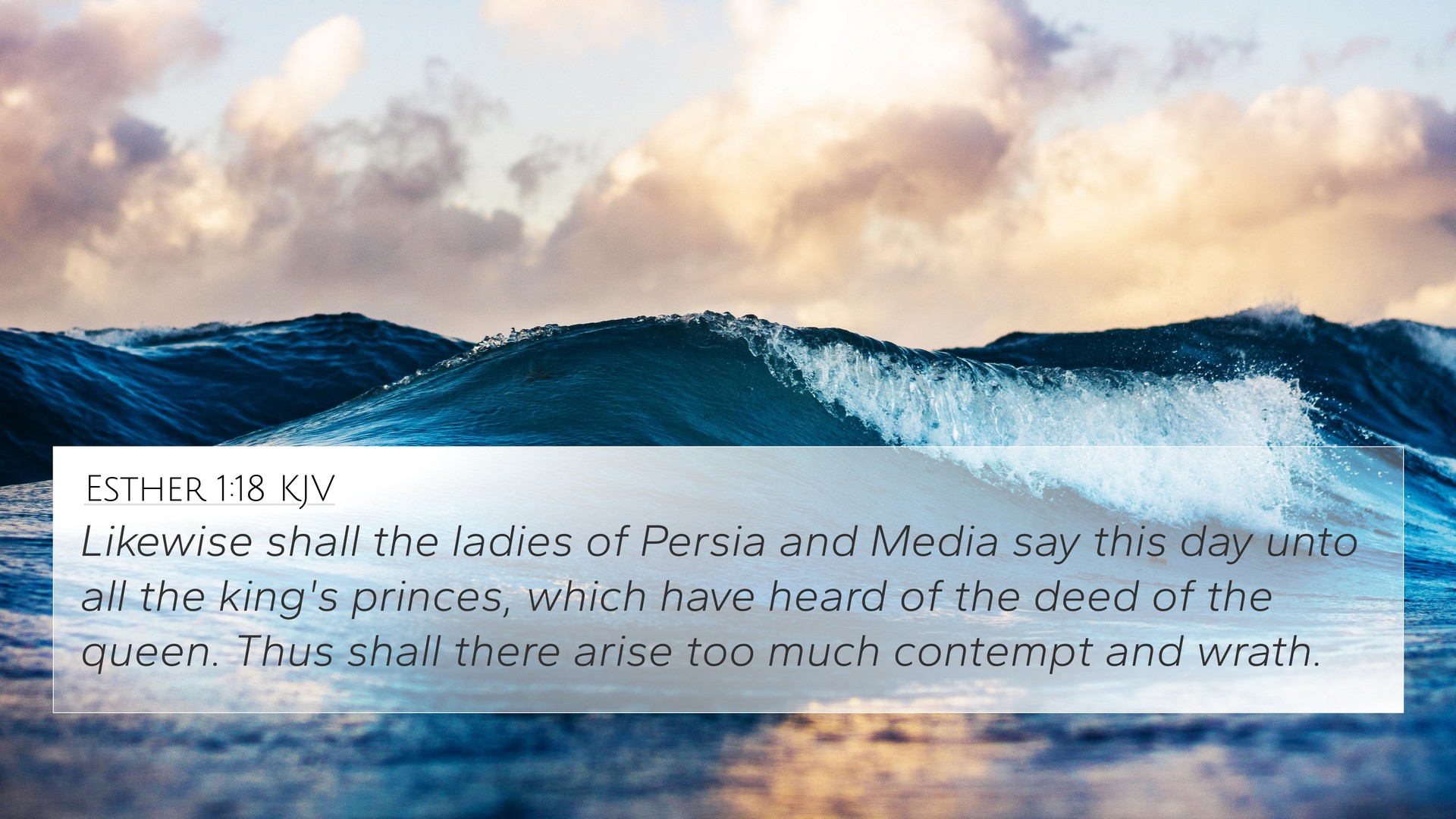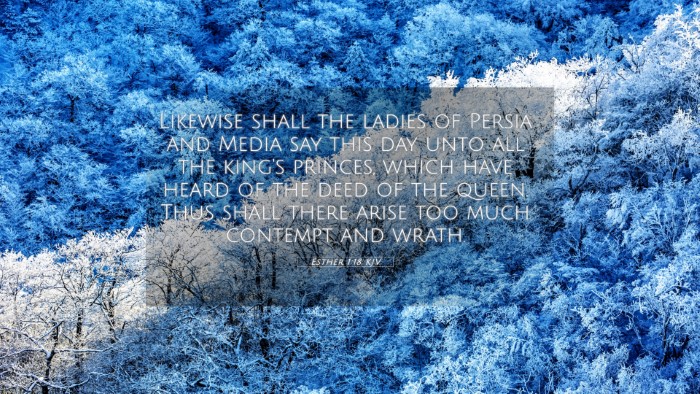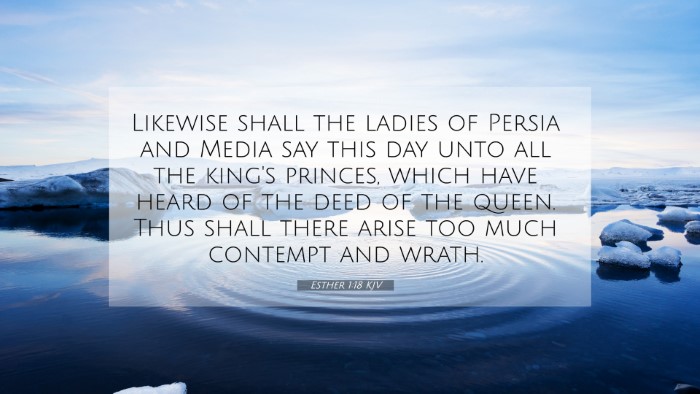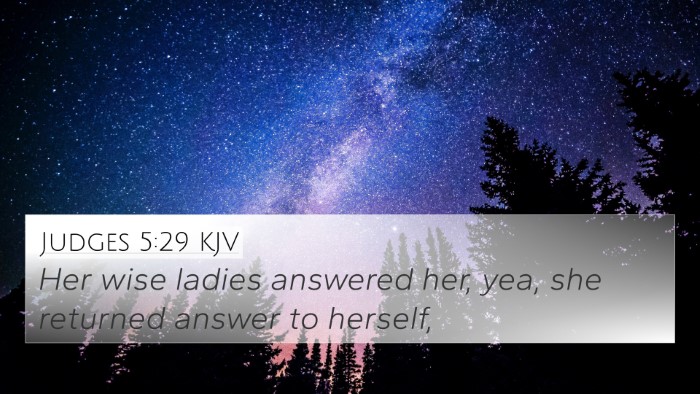Old Testament
Genesis Exodus Leviticus Numbers Deuteronomy Joshua Judges Ruth 1 Samuel 2 Samuel 1 Kings 2 Kings 1 Chronicles 2 Chronicles Ezra Nehemiah Esther Job Psalms Proverbs Ecclesiastes Song of Solomon Isaiah Jeremiah Lamentations Ezekiel Daniel Hosea Joel Amos Obadiah Jonah Micah Nahum Habakkuk Zephaniah Haggai Zechariah MalachiEsther 1:18 Similar Verses
Esther 1:18 Cross References
Likewise shall the ladies of Persia and Media say this day unto all the king's princes, which have heard of the deed of the queen. Thus shall there arise too much contempt and wrath.
Uncover the Rich Themes and Topics of This Bible Verse
Listed below are the Bible themes associated with Esther 1:18. We invite you to explore each theme to gain deeper insights into the Scriptures.
Esther 1:18 Cross Reference Verses
This section features a detailed cross-reference designed to enrich your understanding of the Scriptures. Below, you will find carefully selected verses that echo the themes and teachings related to Esther 1:18 KJV. Click on any image to explore detailed analyses of related Bible verses and uncover deeper theological insights.
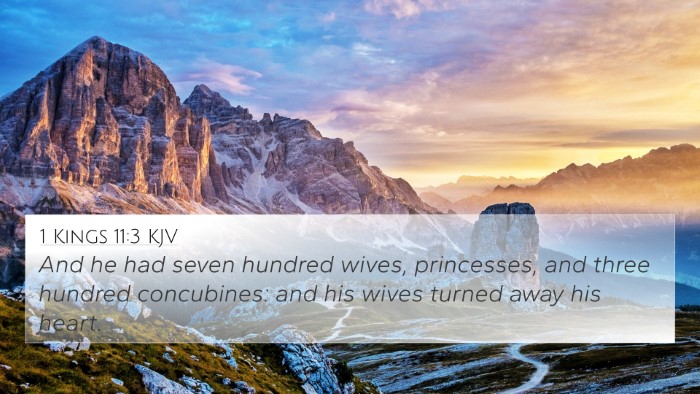
1 Kings 11:3 (KJV) »
And he had seven hundred wives, princesses, and three hundred concubines: and his wives turned away his heart.
Esther 1:18 Verse Analysis and Similar Verses
Meaning and Interpretation of Esther 1:18
Esther 1:18 states: "Likewise shall the ladies of Persia and Media say this day unto all the king’s princes, which have heard of the deed of the queen. Thus shall there arise too much contempt and wrath."
Summary of Insights from Public Domain Commentaries
Esther 1:18 highlights the potential social implications of Queen Vashti's refusal to be presented to King Ahasuerus. The following summaries draw from notable commentaries to elaborate on its meaning and significance.
Matthew Henry's Commentary
Matthew Henry emphasizes the importance of Vashti’s act of defiance as a statement against the objectification of women in royal courts. This event illustrates the significant consequences of personal decisions within broader societal norms.
- Henry notes that the reaction of the Persian and Media women is a cautionary tale about the potential for discontent and rebellion to spread. It serves as an example of how actions by a single individual can trigger widespread ramifications.
- The commentary also stresses the role of pride and the expectations of women in these cultures, showing how public opinions can shape and reinforce social structures.
Albert Barnes' Notes on the Bible
Albert Barnes interprets this verse to indicate the influence of noble ladies and the lubrication of power dynamics in the kingdom. He points out that such situations tend to set dangerous precedents.
- Barnes explains that the ladies of Persia and Media would likely mimic Vashti’s behavior, leading to increasing contempt for male authority. This reflects on the fragility of traditional gender roles when challenged.
- He suggests that this verse outlines a crucial turning point in the narrative of Esther, showcasing the themes of courage, pride, and rebellion against unjust authority.
Adam Clarke's Commentary
Adam Clarke examines the sociopolitical context surrounding this event. He suggests that the verse reveals insights into the underlying tensions and power struggles that occur in royal courts.
- Clarke highlights how Vashti’s refusal could lead to a significant challenge against the established norms, stimulating other women to assert their rights and dignity.
- He adds that the king’s court was a microcosm of the larger cultural and moral fabric of society, with Vashti’s defiance serving as both a rejection of subjugation and an assertion of individuality.
Cross-References and Thematic Connections
Esther 1:18 can be cross-referenced with several biblical passages that share themes of power, gender dynamics, and societal expectations. Here are the related verses:
- 1 Kings 11:1-3 - Discusses King Solomon's relationships with foreign women and the implications of seeking approval from them.
- Proverbs 31:30 - Highlights the value of a virtuous woman, which contrasts with Vashti's situation yet reaffirms women's moral strength.
- Matthew 5:14-16 - Speaks about being a light to the world, akin to Vashti standing for her beliefs publicly.
- Galatians 5:1 - Encourages freedom, paralleling the theme of rebellion against oppressive structures.
- 1 Timothy 2:9-10 - Discusses the adornment of women, relating to how the king viewed Vashti’s value.
- Luke 1:52 - Captures the concept of God uplifting the humble, linking to Vashti’s potential role as a symbol of rightful dignity.
- Acts 5:29 - Highlights the principle of obeying God over human authorities, relevant to Vashti’s defiance.
Cross-Referencing Themes and Insights
The thematic connections between Esther 1:18 and the other scriptures invite further exploration into gender roles, power dynamics, and social order within a biblical context. These connections can guide individuals in:
- Understanding the implications of personal decisions on societal structures (Esther) vs. divine principles (Galatians).
- Analyzing the biblical narrative and connections that emphasize moral and ethical righteousness in contexts of oppression.
- The contemporary application of themes by women challenging societal norms and asserting their identities.
Practical Applications for Cross-Referencing
Engaging with cross-references provides deep insights into how biblical texts inform one another and can be beneficial for:
- Studying: Use a Bible cross-reference guide to examine the links between scriptures.
- Sermon Preparation: Utilize conditional statements and comparative analysis to enrich sermon themes.
- Research and Reflection: Identify correlations between verses to better understand Biblical narratives and their implications.
Conclusion
Esther 1:18 serves as a powerful reminder of the potential consequences of personal actions within a societal framework, especially regarding gender. The combined insights from public domain commentaries reveal its layered meaning, while connecting it to broader themes across scripture enhances our understanding of God's message regarding dignity, defiance, and the interplay of authority and rebellion.
